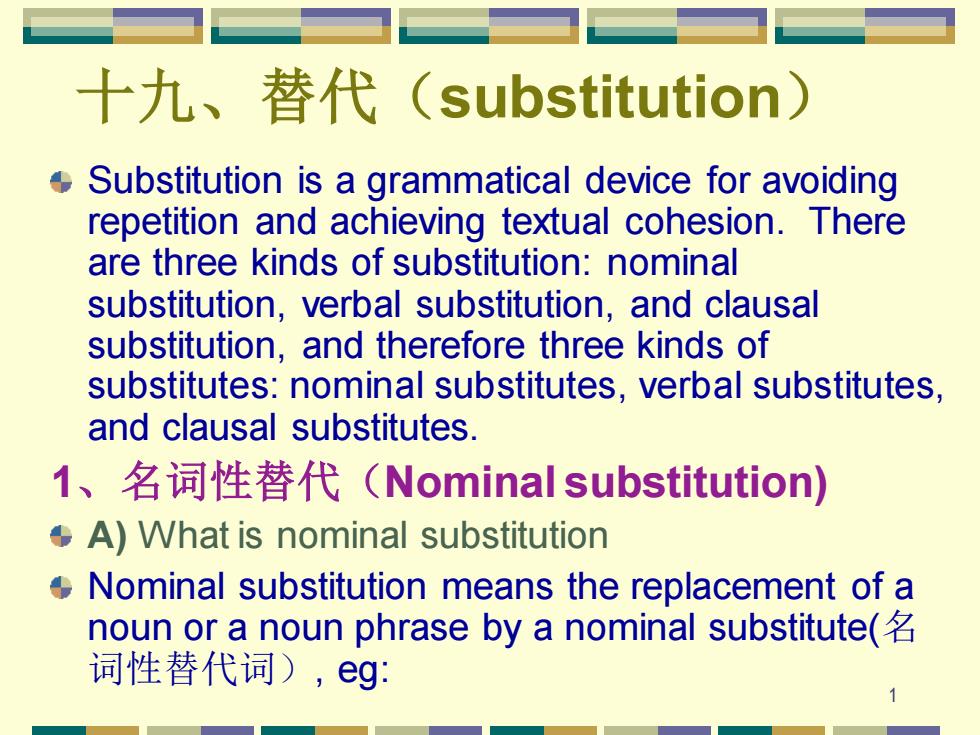
十九、替代 (substitution) Substitution is a grammatical device for avoiding repetition and achieving textual cohesion.There are three kinds of substitution:nominal substitution,verbal substitution,and clausal substitution,and therefore three kinds of substitutes:nominal substitutes,verbal substitutes, and clausal substitutes. 1、名词性替代(Nominal substitution) A)What is nominal substitution Nominal substitution means the replacement of a noun or a noun phrase by a nominal substitute( 词性替代词),eg: 1
1 十九、替代(substitution) Substitution is a grammatical device for avoiding repetition and achieving textual cohesion. There are three kinds of substitution: nominal substitution, verbal substitution, and clausal substitution, and therefore three kinds of substitutes: nominal substitutes, verbal substitutes, and clausal substitutes. 1、名词性替代(Nominal substitution) A) What is nominal substitution Nominal substitution means the replacement of a noun or a noun phrase by a nominal substitute(名 词性替代词), eg:
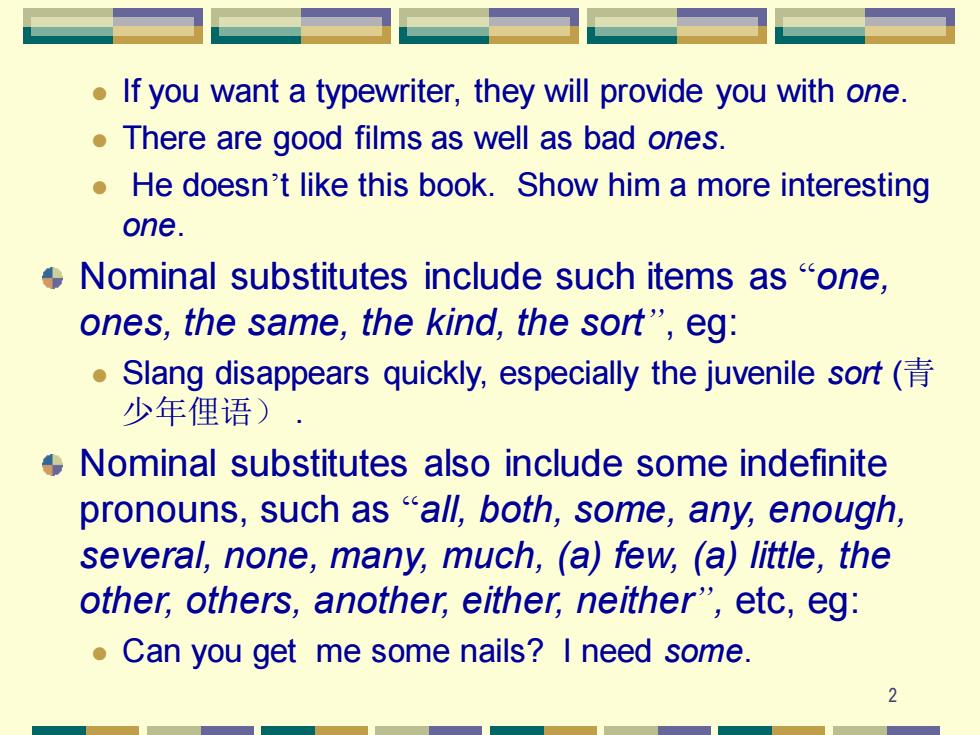
If you want a typewriter,they will provide you with one. There are good films as well as bad ones. He doesn't like this book.Show him a more interesting one. Nominal substitutes include such items as"one, ones,the same,the kind,the sort",eg: Slang disappears quickly,especially the juvenile sort 少年俚语)· Nominal substitutes also include some indefinite pronouns,such as "all,both,some,any,enough several,none,many,much,(a)few,(a)little,the other,others,another,either,neither",etc,eg: Can you get me some nails?I need some
2 ⚫ If you want a typewriter, they will provide you with one. ⚫ There are good films as well as bad ones. ⚫ He doesn’t like this book. Show him a more interesting one. Nominal substitutes include such items as “one, ones, the same, the kind, the sort”, eg: ⚫ Slang disappears quickly, especially the juvenile sort (青 少年俚语) . Nominal substitutes also include some indefinite pronouns, such as “all, both, some, any, enough, several, none, many, much, (a) few, (a) little, the other, others, another, either, neither” , etc, eg: ⚫ Can you get me some nails? I need some
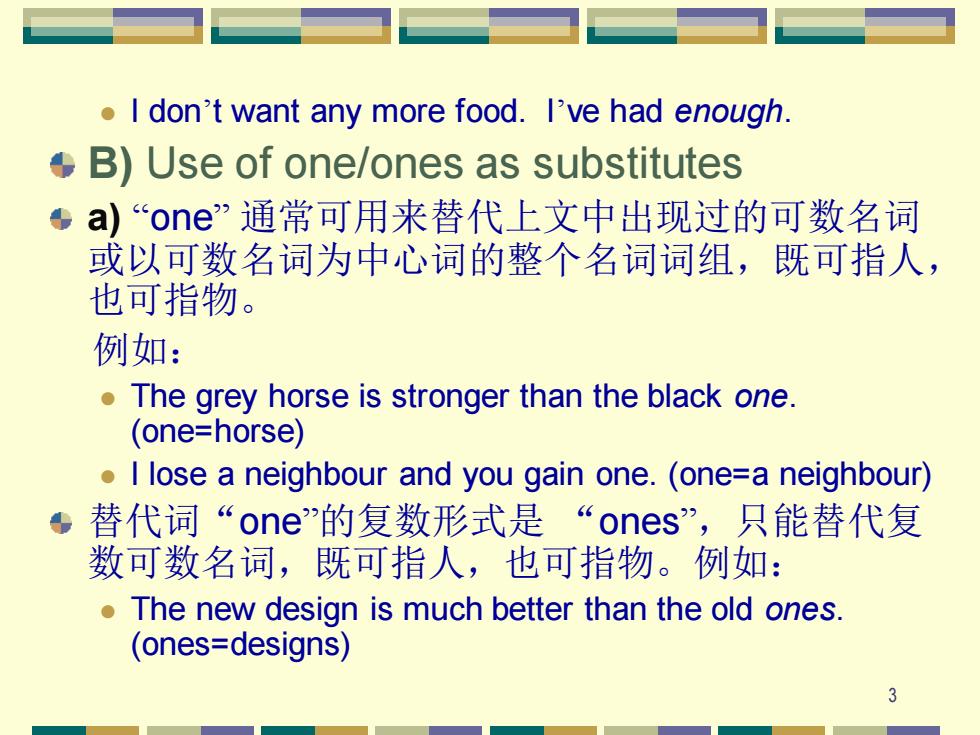
I don't want any more food.I've had enough. B)Use of one/ones as substitutes a)one”通常可用来替代上文中出现过的可数名词 或以可数名词为中心词的整个名词词组,既可指人, 也可指物。 例如: The grey horse is stronger than the black one. (one=horse) .I lose a neighbour and you gain one.(one=a neighbour) 替代词“one的复数形式是“ones”,只能替代复 数可数名词,既可指人,也可指物。例如: The new design is much better than the old ones. (ones=designs) 3
3 ⚫ I don’t want any more food. I’ve had enough. B) Use of one/ones as substitutes a) “one” 通常可用来替代上文中出现过的可数名词 或以可数名词为中心词的整个名词词组,既可指人, 也可指物。 例如: ⚫ The grey horse is stronger than the black one. (one=horse) ⚫ I lose a neighbour and you gain one. (one=a neighbour) 替代词“one”的复数形式是 “ones” ,只能替代复 数可数名词,既可指人,也可指物。例如: ⚫ The new design is much better than the old ones. (ones=designs)
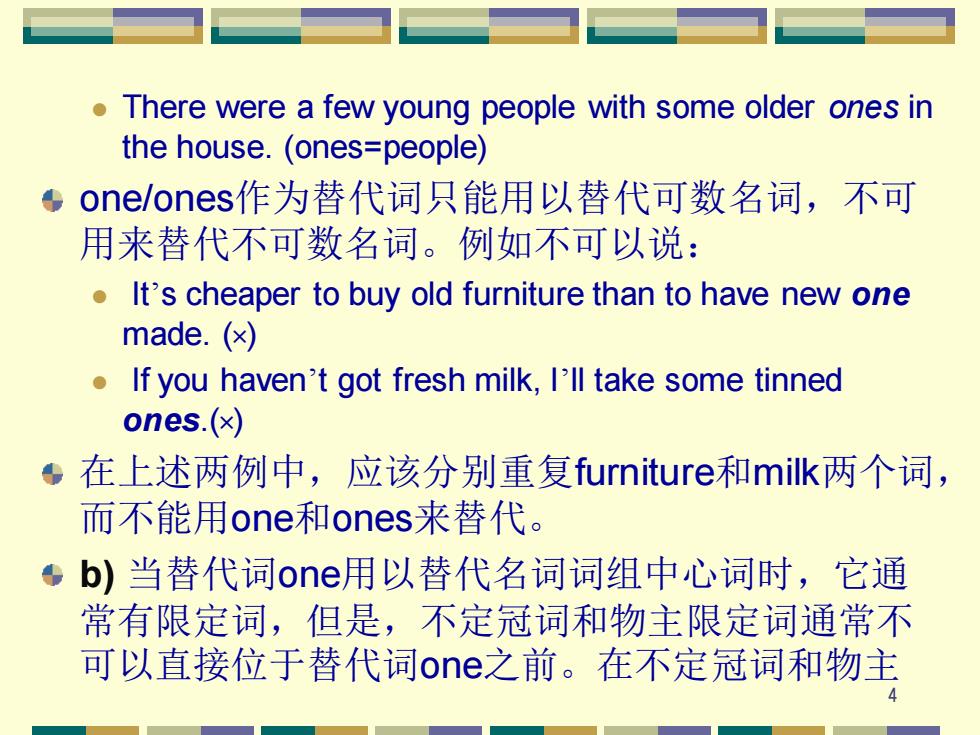
There were a few young people with some older ones in the house.(ones=people) 5 one/ones作为替代词只能用以替代可数名词,不可 用来替代不可数名词。例如不可以说: It's cheaper to buy old furniture than to have new one made.(x) If you haven't got fresh milk,I'll take some tinned ones.(x) s在上述两例中,应该分别重复furniture和milk两个词, 而不能用one和ones来替代。 b)当替代词one用以替代名词词组中心词时,它通 常有限定词,但是,不定冠词和物主限定词通常不 可以直接位于替代词one之前。在不定冠词和物主
4 ⚫ There were a few young people with some older ones in the house. (ones=people) one/ones作为替代词只能用以替代可数名词,不可 用来替代不可数名词。例如不可以说: ⚫ It’s cheaper to buy old furniture than to have new one made. (╳) ⚫ If you haven’t got fresh milk, I’ll take some tinned ones.(╳) 在上述两例中,应该分别重复furniture和milk两个词, 而不能用one和ones来替代。 b) 当替代词one用以替代名词词组中心词时,它通 常有限定词,但是,不定冠词和物主限定词通常不 可以直接位于替代词one之前。在不定冠词和物主
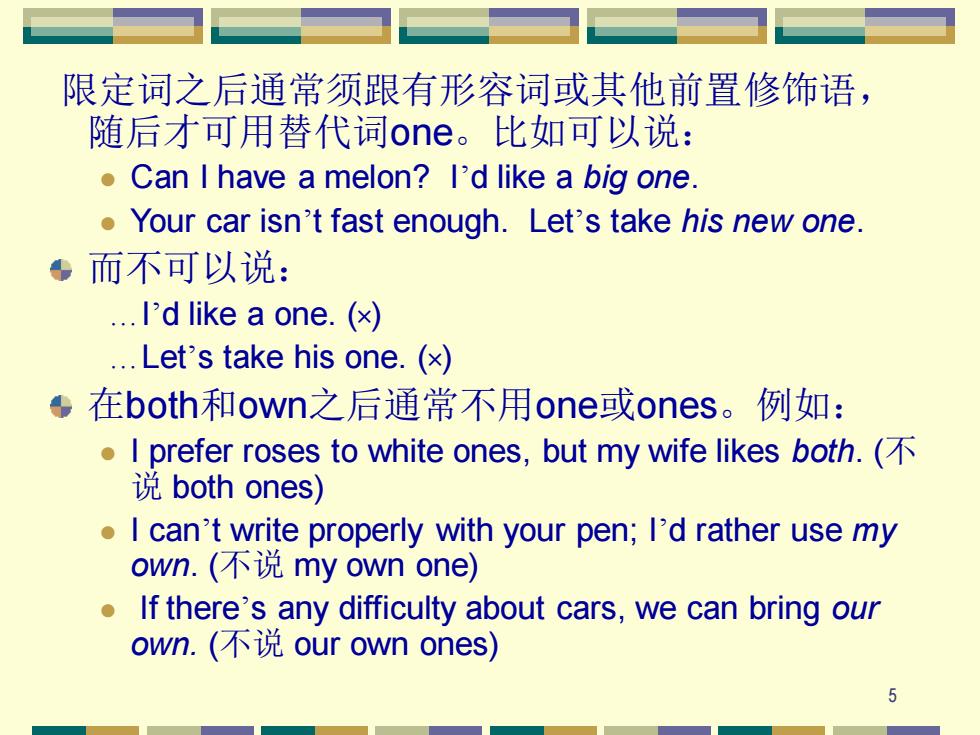
限定词之后通常须跟有形容词或其他前置修饰语, 随后才可用替代词one。比如可以说: Can I have a melon?I'd like a big one. Your car isn't fast enough.Let's take his new one $而不可以说: ...I'd like a one.(x) ..Let's take his one.(x) 号在both和own之后通常不用one或ones。例如: I prefer roses to white ones,but my wife likes both. 说both ones) I can't write properly with your pen;I'd rather use my own.(不说ny own one) If there's any difficulty about cars,we can bring our own.(不说our own ones) 5
5 限定词之后通常须跟有形容词或其他前置修饰语, 随后才可用替代词one。比如可以说: ⚫ Can I have a melon? I’d like a big one. ⚫ Your car isn’t fast enough. Let’s take his new one. 而不可以说: …I’d like a one. (╳) …Let’s take his one. (╳) 在both和own之后通常不用one或ones。例如: ⚫ I prefer roses to white ones, but my wife likes both. (不 说 both ones) ⚫ I can’t write properly with your pen; I’d rather use my own. (不说 my own one) ⚫ If there’s any difficulty about cars, we can bring our own. (不说 our own ones)
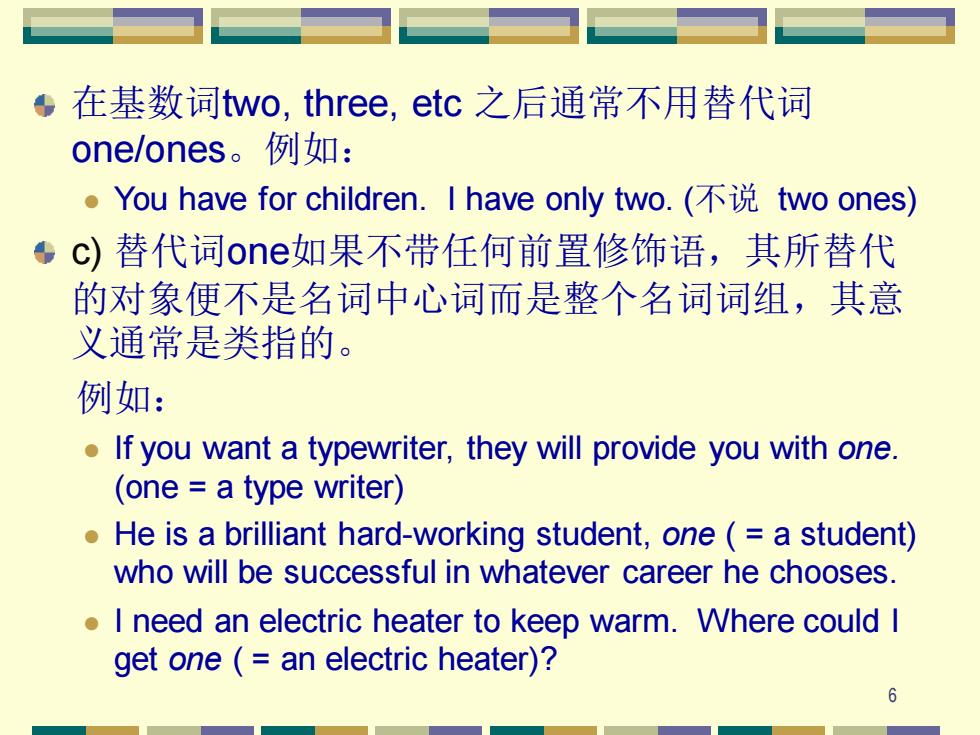
在基数词two,three,etc之后通常不用替代词 one/ones。例如: ●You have for children.I have only two..(不说two ones) c)替代词one如果不带任何前置修饰语,其所替代 的对象便不是名词中心词而是整个名词词组,其意 义通常是类指的。 例如: If you want a typewriter,they will provide you with one. (one a type writer) He is a brilliant hard-working student,one (a student) who will be successful in whatever career he chooses. I need an electric heater to keep warm.Where could I get one (an electric heater)?
6 在基数词two, three, etc 之后通常不用替代词 one/ones。例如: ⚫ You have for children. I have only two. (不说 two ones) c) 替代词one如果不带任何前置修饰语,其所替代 的对象便不是名词中心词而是整个名词词组,其意 义通常是类指的。 例如: ⚫ If you want a typewriter, they will provide you with one. (one = a type writer) ⚫ He is a brilliant hard-working student, one ( = a student) who will be successful in whatever career he chooses. ⚫ I need an electric heater to keep warm. Where could I get one ( = an electric heater)?
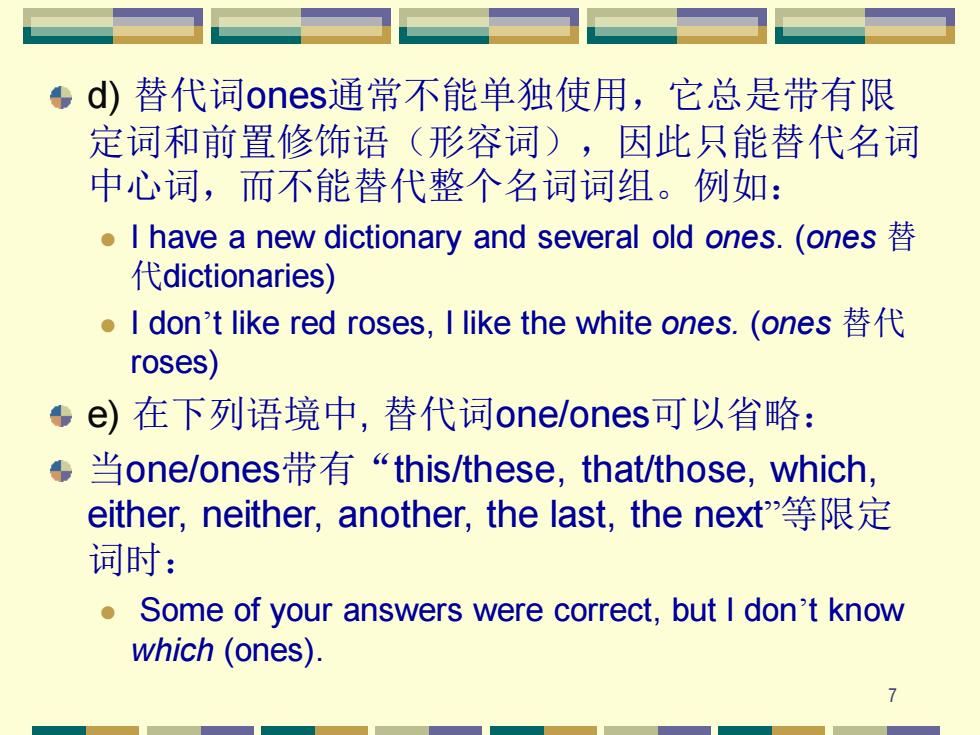
d)替代词ones通常不能单独使用,它总是带有限 定词和前置修饰语(形容词),因此只能替代名词 中心词,而不能替代整个名词词组。例如: I have a new dictionary and several old ones.(ones 代dictionaries) ●Idon't like red roses,I like the white ones.(ones替代 roses) e)在下列语境中,替代词one/ones可以省略: s当one/ones带有“this/these,that/those,which, either,.neither,.another,the last,the next等限定 词时: Some of your answers were correct,but I don't know which (ones)
7 d) 替代词ones通常不能单独使用,它总是带有限 定词和前置修饰语(形容词),因此只能替代名词 中心词,而不能替代整个名词词组。例如: ⚫ I have a new dictionary and several old ones. (ones 替 代dictionaries) ⚫ I don’t like red roses, I like the white ones. (ones 替代 roses) e) 在下列语境中, 替代词one/ones可以省略: 当one/ones带有“this/these, that/those, which, either, neither, another, the last, the next”等限定 词时: ⚫ Some of your answers were correct, but I don’t know which (ones)
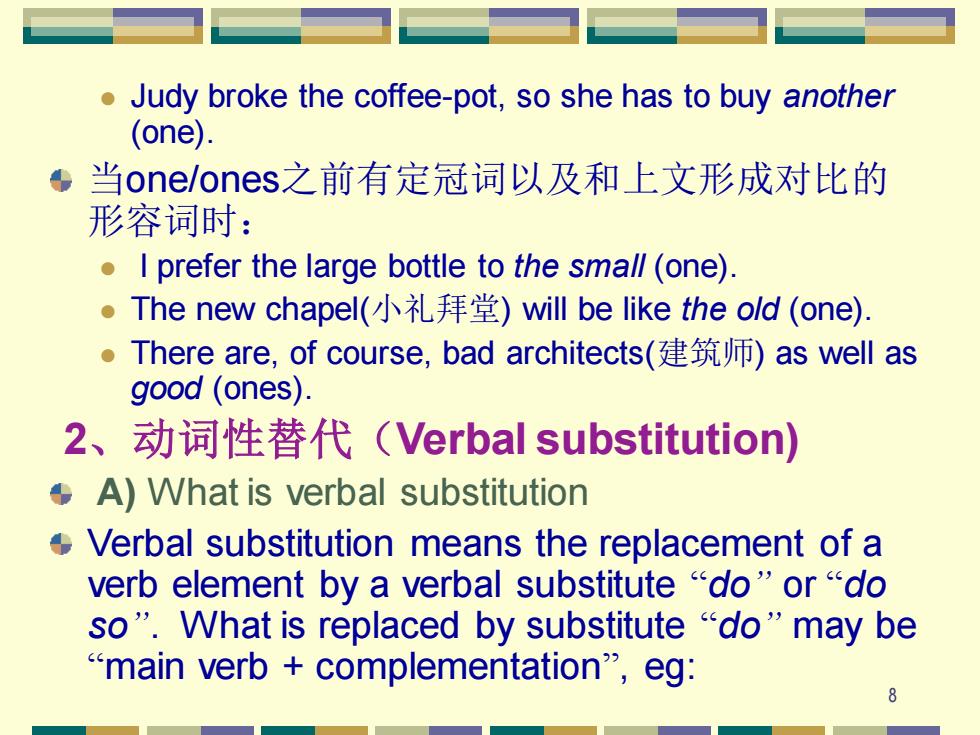
Judy broke the coffee-pot,so she has to buy another (one). 当one/ones之前有定冠词以及和上文形成对比的 形容词时: I prefer the large bottle to the small(one). ●The new chapel(小礼拜堂)will be like the old(one). ·There are,of course,bad architects(建筑师)as well as good (ones). 2、动词性替代(Verbal substitution) A)What is verbal substitution Verbal substitution means the replacement of a verb element by a verbal substitute“do'or“do so'”.Vhat is replaced by substitute“do'”may be “main verb+complementation”,eg:
8 ⚫ Judy broke the coffee-pot, so she has to buy another (one). 当one/ones之前有定冠词以及和上文形成对比的 形容词时: ⚫ I prefer the large bottle to the small (one). ⚫ The new chapel(小礼拜堂) will be like the old (one). ⚫ There are, of course, bad architects(建筑师) as well as good (ones). 2、动词性替代(Verbal substitution) A) What is verbal substitution Verbal substitution means the replacement of a verb element by a verbal substitute “do” or “do so”. What is replaced by substitute “do” may be “main verb + complementation”, eg:
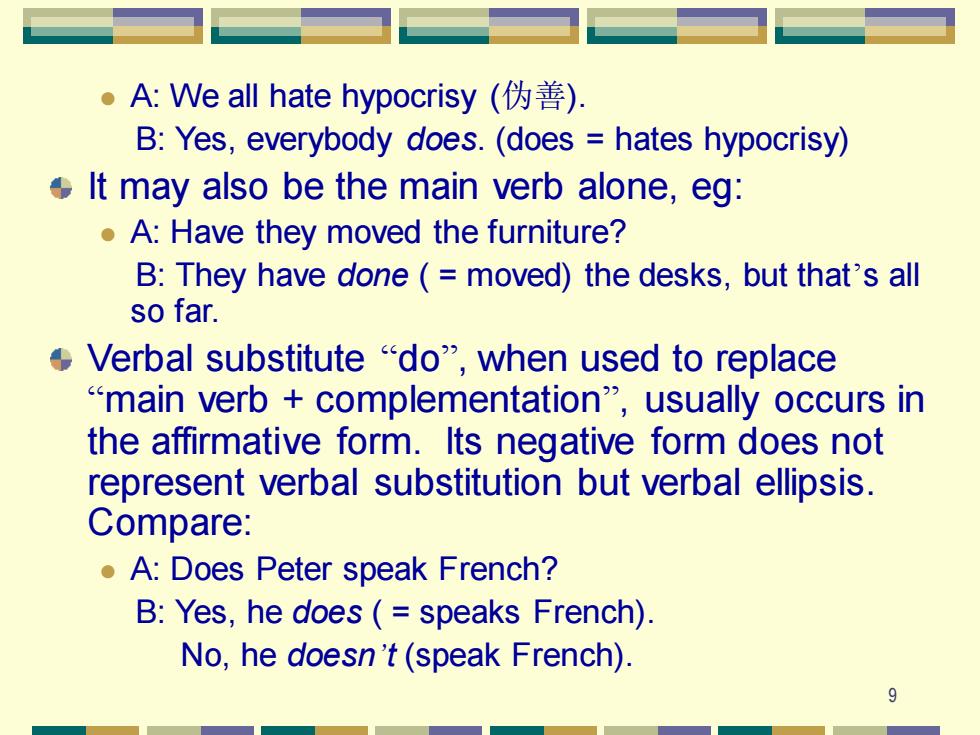
。A:Ve all hate hypocrisy(伪善). B:Yes,everybody does.(does hates hypocrisy) It may also be the main verb alone,eg: A:Have they moved the furniture? B:They have done (moved)the desks,but that's all so far. Verbal substitute“do”,when used to replace "main verb complementation",usually occurs in the affirmative form.Its negative form does not represent verbal substitution but verbal ellipsis. Compare: .A:Does Peter speak French? B:Yes,he does(=speaks French) No,he doesn't (speak French). 9
9 ⚫ A: We all hate hypocrisy (伪善). B: Yes, everybody does. (does = hates hypocrisy) It may also be the main verb alone, eg: ⚫ A: Have they moved the furniture? B: They have done ( = moved) the desks, but that’s all so far. Verbal substitute “do”, when used to replace “main verb + complementation”, usually occurs in the affirmative form. Its negative form does not represent verbal substitution but verbal ellipsis. Compare: ⚫ A: Does Peter speak French? B: Yes, he does ( = speaks French). No, he doesn’t (speak French)
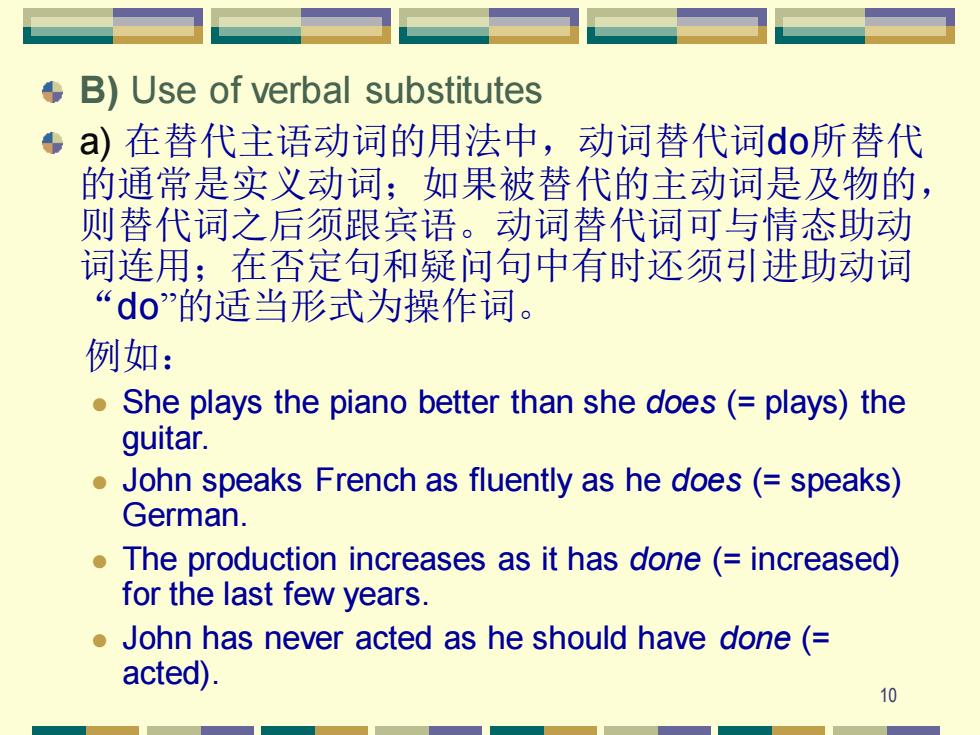
B)Use of verbal substitutes a)在替代主语动词的用法中,动词替代词do所替代 的通常是实义动词;如果被替代的主动词是及物的, 则替代词之后须跟宾语。动词替代词可与情态助动 词连用;在否定句和疑问句中有时还须引进助动词 “do的适当形式为操作词。 例如: She plays the piano better than she does(=plays)the guitar. John speaks French as fluently as he does (speaks) German. The production increases as it has done (increased) for the last few years. ●John has never acted as he should have done(∈ acted). 10
10 B) Use of verbal substitutes a) 在替代主语动词的用法中,动词替代词do所替代 的通常是实义动词;如果被替代的主动词是及物的, 则替代词之后须跟宾语。动词替代词可与情态助动 词连用;在否定句和疑问句中有时还须引进助动词 “do”的适当形式为操作词。 例如: ⚫ She plays the piano better than she does (= plays) the guitar. ⚫ John speaks French as fluently as he does (= speaks) German. ⚫ The production increases as it has done (= increased) for the last few years. ⚫ John has never acted as he should have done (= acted)